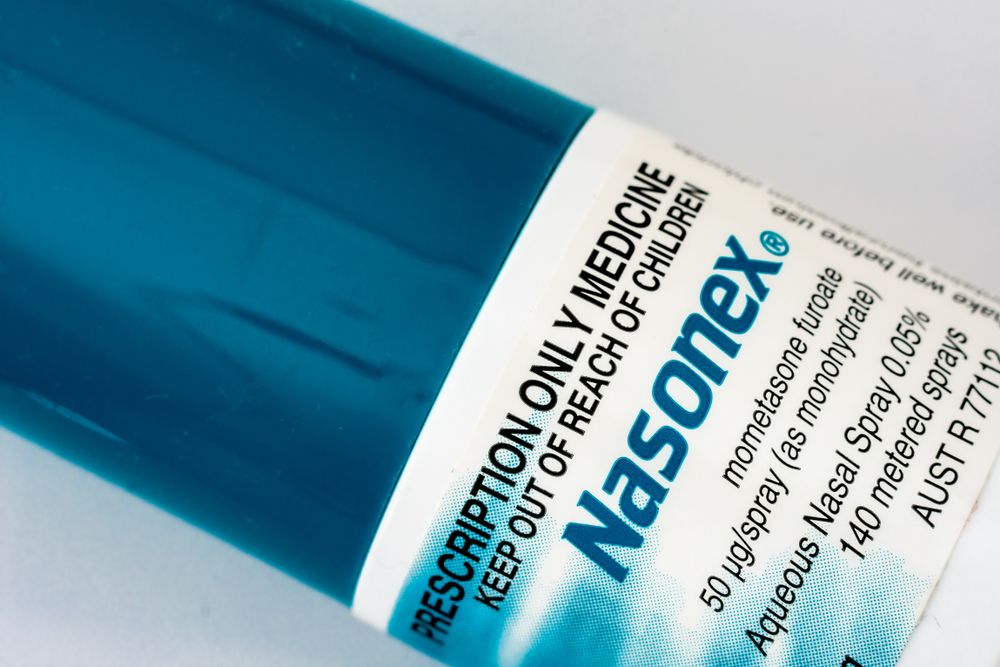Nasonex Side Effects (Short-Term & Long-Term) to Be Aware Of
A runny nose is often the result of the common cold, and it can be a nuisance. There are many nasal sprays you can use to quell your runny nose. (Learn More) When used as directed, these sprays can be a great asset to those seeking comfort.
You may have heard conflicting information about the need for nasal sprays and their side effects. (Learn More) A continued need for nasal spray may signify another problem that needs to be addressed. (Learn More)
Nasonex: An Overview
Nasonex is a prescription nasal spray with mometasone furoate monohydrate as its main ingredient. It belongs to a class of medications called corticosteroids. This family of medications is not the same as the substance famous in athlete doping scandals. Corticosteroids decrease inflammation, a reaction your immune system sets off to protect you from viruses or bacteria. Sometimes your immune system attacks healthy tissue, which could be a problem. Corticosteroids may change how your white blood cells create inflammation, ensuring the health of affected tissue. Nasonex can help with these symptoms:
Runny nose and sneezing resulting from allergic reactions
Nasal polyps
Congestion
People 2 years of age and older can use this medication to treat these symptoms. Adults should supervise children younger than age 12 who need to use Nasonex.

How to Use Nasal Sprays
The medication is usually sprayed into each nostril one or two times daily. If used twice per day, it is used in the morning and at night. Try to use Nasonex at the same time every day for best results. Healthline also recommends the following in preparation for using Nasonex:
Blow your nose into a tissue to get ready to use the spray.
Wash your hands thoroughly afterward.
Shake the bottle of spray if the container or your doctor has said this is necessary.
Use a finger to close the nostril that is not receiving the medication.
Spray the medication into your nostril.
Do the same on the other side.
Nasonex Side Effects
Nasonex has side effects, just like any other medication does. Short-term side effects include the following:
Pain in the sinuses and ears
Sore throat
Joint or muscle pain
Watery or red eyes
Nosebleeds
Heartburn
Diarrhea
Difficulty swallowing
Rash
Hives
Using Nasonex and other nasal sprays is known to cause rebound congestion, or rhinitis medicamentosa. This condition occurs when nasal sprays are used too often, making congestion and other symptoms come back with a vengeance. Scientists are still debating the existence of this condition, but congestion has been known to return in people who use nasal sprays for longer than recommended. Patients should also know that using nasal sprays may cause the blood vessels in your nostrils to get thinner. They tend to thicken once the effects of Nasonex wear off.
Precautions for Patients Who Use Nasonex
Always follow directions from your doctor or the container that holds your medicine. Use Nasonex only as long as instructed to prevent side effects. Let your doctor know if your nose becomes irritated or experiences bleeding. Never share your Nasonex with others or allow your spray bottle to touch dirty surfaces. Both of these practices could cause or spread an infection in your nose. You should take additional precautions with Nasonex if:
You have glaucoma or cataracts. Nasonex may worsen these conditions.
You take certain antibiotics or antifungal medications.
You take antidepressants or HIV medications.
You are pregnant or breastfeeding.
You have liver disease.
Nasonex is known to interact with certain medications and supplements. It is possible to misuse Nasonex or start depending on it because of rebound congestion. Talk to your doctor if your symptoms do not go away even after using Nasonex as directed.

Frequently Asked Questions
What does Nasonex treat?
Nasonex is a nasal spray that treats inflammation in the nose caused by polyps, seasonal allergies, and a runny nose. It is not a cure for these issues, but it can make it easier for you to breathe.
Does Nasonex have short-term or long-term side effects?
Yes, some short-term side effects associated with Nasonex are nosebleeds, pain in the ears and sinuses, and heartburn. Some people may also develop heartburn and diarrhea. Long-term effects could include rebound congestion. This happens when you continually use Nasonex. It creates a cycle through which the nasal spray addresses inflammation, and the symptoms come back once it wears off. Side effects can be worse in people with liver or eye problems. People who take certain kinds of medication may also experience side effects or interactions.
When should I reduce my use or stop using Nasonex altogether?
Since Nasonex is a prescription medication, your doctor will most likely tell you how long and how often to use it. You should stop using Nasonex if you experience serious side effects, such as a possible allergic reaction to the medication, or if your symptoms do not go away after using the medication as indicated. If your symptoms come back after consistently using the medication as necessary, discuss this with your doctor. This could indicate rebound congestion or another health issue. Patients who become pregnant should also talk to their doctor about stopping use of Nasonex.
References
How to Use Nasal Spray. (June 2016). Healthline.
Nasal Sprays Work Best When You Use Them Correctly — Here’s How. (October 2016). Cleveland Clinic.
Mometasone, Nasal Suspension, Spray. (May 2019). Healthline.
Mometasone Nasal Spray. (July 2018). MedlinePlus.
Reducing Dependence on Decongestant Nasal Sprays. (January 2015). Pharmacy Times.
What You Should Know Before Taking Nasonex. (July 2019). Verywell Health.
Can You Become Addicted to Nasal Spray? (December 2017). Healthline.
Corticosteroids. (March 2015). Cleveland Clinic.

Related Articles

10 Popular Statin Medications - Comparison, Side Effects & How They Work
Statins are among the most commonly prescribed...

Pregabalin vs Gabapentin - Comparison Guide & Similarities
Pregabalin vs Gabapentin, are both classified as...

Zepbound vs Mounjaro Comparison Guide: Similarities, Side Effects & More
Zepbound vs Mounjaro Comparison Guide...

Aleve vs Advil - What's The Difference? Comparing These NSAIDs
SaveHealth a prescription website compares Aleve vs Advil...
